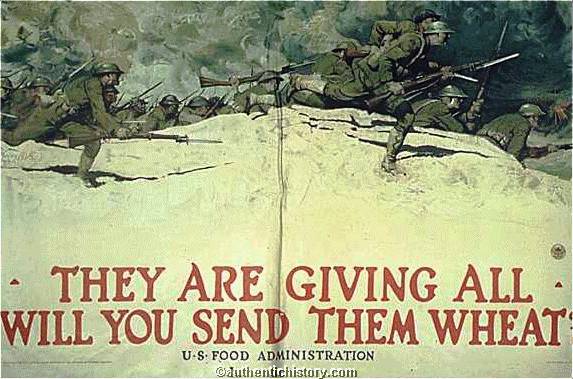I know a farm woman who is wearing overalls this spring at her
outdoor work. "They wear overalls in the munition factories," she says.
"Isn't the raising of food to preserve life as important as the making
of shells to take it? Why should I be hampered in my work and
tormented by skirts flapping around my ankles when I am out in the field?"
Sweet, Orr and Company overalls for women advertisement
(1917)
Why indeed! When every bit of one's time and strength can be put to such
good use in work that it is so very necessary to the world, it seems foolish to
spend any of it uselessly. The simpler and more suitably we can dress the
better. This year of our Lord 1917 is no time for giving much attention to frills;
and when we remember the tight skirts of recent date, we surely cannot accuse
overalls of being immodest. As the Man of the Place said to me,
"Just hunt up a couple of your old tight skirts and sew them together,
then you'll have a pair of overalls."
We all feel that we would like to do something to help our country in
these perilous times, however, much we may regret the necessity.
We may do this; without leaving our homes or exposing ourselves to
new and fearful dangers. Not that country women would hesitate to
take these risks if it were necessary, but it is natural to be glad that
we may help as much or more in our own accustomed ways.
Women in the towns and cities can be spared to work in the
factories, to make munitions, to join the Navy, or to go as nurses
with the Red Cross; but what would happen to the world if the
farm woman should desert their present posts?
Our work is not spectacular and in doing it faithfully we shall win
no war medals or decorations, but it is absolutely indispensable.
We may feed the field hands, care for the poultry, and work in the garden with
the full assurance that we are doing as much for our country as any other person.
Here in the hills, we have helped plant the potatoes and corn; we help with
the milking and feed the calves and hogs; and we will be found on the line
just behind the trenches, "fighting for Uncle Sam," as I heard one woman say;
and every extra dozen eggs, pound of meat, or bushel of vegetables we
raise will help beat back the enemy, hunger.
Some women were talking over an entertainment that had been planned
for the crowd. They seemed to be taking only a half-hearted interest in the
subject, and finally one of them exclaimed: "I can't feel right about doing this!
It does not seem to me that this is a time to be feasting and frolicking. I do
not think we ought to eat an unnecessary mouthful, and sometimes I feel
like choking on the food I do eat when I think of people in the world
who are hungry and starving." I fully agree with her.
When there seems to be not enough food to go around, we ought to be
as careful and economical with it as possible. If it is true, as we are told,
that most of us have the bad habit of overeating, now is a good time
to break that habit. I am sure that we farm women will not be found
second to those of any other occupation in willingness to bear our part
in effort or in self-denial, and if, as experts say, "armies travel on
their stomachs," we are doing our best to enable the soldiers of
the United States to go as far as those of any other nation.
"Each In His Place"
(May 1917)
Laura Ingalls Wilder
(1867-1957)
Prolific American writer,
patriot, and pioneer girl.
From the book,
"Little House In The Ozarks"
A Laura Ingalls Wilder Sampler
The Rediscovered Writings
Edited by Stephen W. Hines
Guideposts Edition
(1991)




No comments:
Post a Comment